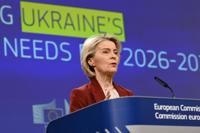NEW YORK (AP) — The White House cannot lapse in its funding of the Consumer Financial Protection Bureau, a federal district court judge ruled …
Iran's Central Bank head has resigned as protests erupted in Tehran and other cities after the currency hit a record low against the U.S. dollar. State TV reported Mohammad Reza Farzin's resignation as hundreds rallied in Tehran's Saadi Street and the Shush neighborhood. The official IRNA news agency confirmed gatherings. Similar rallies were reported in Isfahan, Shiraz and Mashhad. Witnesses said police used tear gas in Tehran. Traders closed shops, urging others to join. Iran's rial fell to 1.38 million to the dollar Monday, worsening inflation and straining budgets. Reports of Farzin's possible resignation circulated last week.
THE HAGUE, Netherlands (AP) — A core question for European Union leaders discussing whether to use frozen Russian assets to help Ukraine is wh…
LONDON (AP) — The Bank of England on Thursday cut its key interest rate for the first time in four months as stubbornly high inflation that ha…
Pedestrians pass the Bank of England in London, a the Monetary Policy Committee (MPC) will publish their decision on interest rates, Thursday, Dec. 18, 2025. (AP Photo/Kirsty Wigglesworth)
Pedestrians pass the Bank of England in London, as the Monetary Policy Committee (MPC) will publish their decision on interest rates, Thursday, Dec. 18, 2025. (AP Photo/Kirsty Wigglesworth)
Pedestrians pass the Bank of England in London, as the Monetary Policy Committee (MPC) will publish their decision on interest rates, Thursday, Dec. 18, 2025. (AP Photo/Kirsty Wigglesworth)
Pedestrians pass the Bank of England in London, as the Monetary Policy Committee (MPC) will publish their decision on interest rates, Thursday, Dec. 18, 2025. (AP Photo/Kirsty Wigglesworth)
The Bank of England is reflected on a wet pavement in London, as the Monetary Policy Committee (MPC) will publish their decision on interest rates, Thursday, Dec. 18, 2025. (AP Photo/Kirsty Wigglesworth)
BRUSSELS (AP) — European Union leaders are gathering Thursday for a summit aimed at agreeing on a massive loan to cover Ukraine's military and…


















